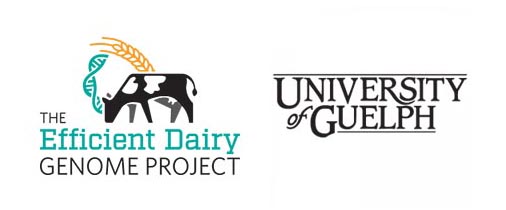The project consists of several inter-related research activities focused on increasing feed efficiency (FE) and decreasing methane emissions (ME) in the dairy industry:
- FE and ME – enlarging the database for genomic analysis through increased data collection on these two traits and collaboration with international groups
- Using milk infrared spectroscopy data as an indicator of FE
- Genome-Wide Association Studies (GWAS) to identify genomic regions associated with FE and ME
- Whole-genome sequencing, variant discovery and functional studies to better understand the underlying biology of FE and ME
- Development and implementation of Canadian genomic evaluations for FE and ME in the Canadian dairy industry
- Social and Economic Benefits of selecting for these two traits for society and for industry
Feed Efficiency and Methane Emissions Database
Phenotypic and genotypic data on FE and ME will be collected in Canada from three sources, including a large dairy farm in Alberta and this data will be combined with data from our international collaborators. A project database is being developed at CDN for data storage and for data exchange between partners. Genetic and genomic analysis will be performed and genomic selection models developed and tested.
This will be the world’s first database to routinely validate genomic predictions for FE and ME.
Milk Infrared (MIR) Spectral Data
The objective is to develop methods to utilise milk spectral data (MIR) as a phenotype that is correlated with FE and ME. This includes an increase in the amount of milk spectral data collected and then the development, evaluation and application of methods so that milk spectral data can be used as correlated traits for FE and ME.
GWAS and Whole-Genome Sequencing and Functional Studies
These areas of research will identify genomic regions and/or mutations or variants that are associated with phenotypes associated with FE and ME. This will also help to understand the underlying biology of these two traits.
Development and implementation of Canadian genomic evaluations for FE and ME in the Canadian dairy industry
The first aim is to develop and implement a routine genomic evaluation service for FE and ME available to producers and the AI industry weekly. The second aim is to develop improved methods for deriving Relative Economic Values. These improved methods will become part of the revised genomic evaluations and selection indices.
Genomics and its ethical, economic, environmental, legal and social aspects (GE3LS)
This area of research will be conducted to define the social, environmental and economic costs/benefits of selecting for FE and ME. In addition, identification of any barriers to adoption at the farm, industry and national levels will be assessed to provide insights into actual uptake of these technologies.
